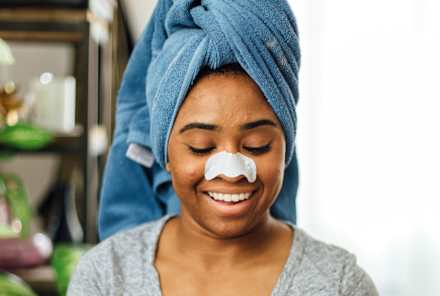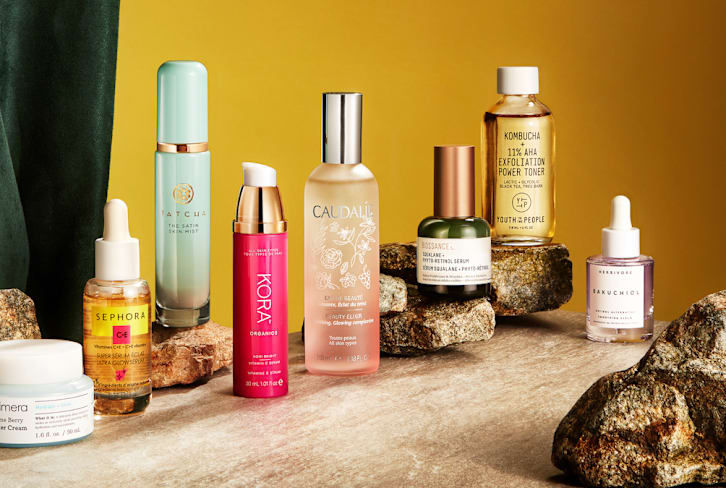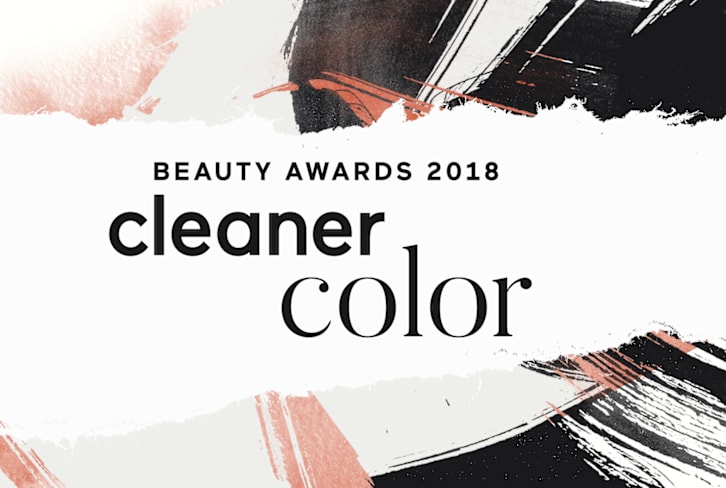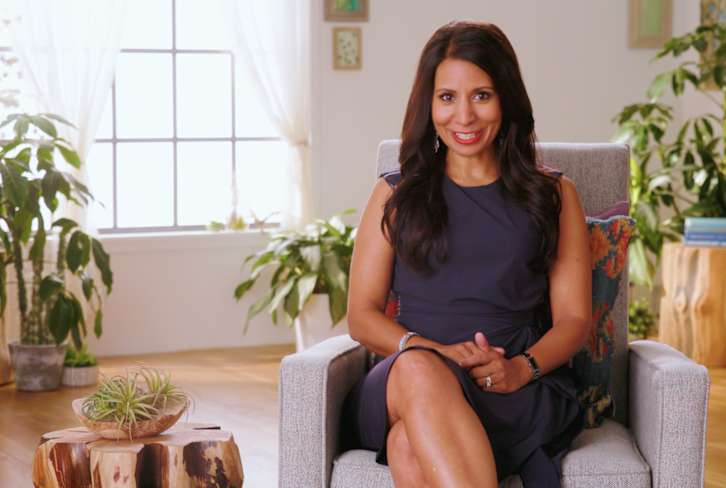Advertisement

I don't like the notion that my identity is based on my hair. Somehow, it feels shallow or silly to think that my image of myself could be affected by something as superficial as hair. In fact, to prove that I was above this, I hacked off my mane shortly after my mom died and my second daughter was born. In retrospect, that was a pretty intense time to make such a bold decision, and I wouldn't recommend doing drastic things to your hair when you're in a grief-riddled hormone storm. As my pixie cut (not my best look) grew out over the next few years, I realized my identity and my hair may be woven together more than I had been willing to admit.
Hair is an important piece of the picture we present to the world every day. It affects how you hold your head and how you move your body, and it can influence how you feel about yourself on any given day. Hair can also be indicative of health—if your hair is full and shiny, it imparts a vibrant image of wellness. If it's falling out or thinning, it could indicate an underlying problem. So, how can you keep your hair as healthy and happy as possible? Let's review the basics.
The anatomy of hair.
Did you know that you're born with all your hair follicles (about 5 million), and you can't grow any more? As your scalp grows, your follicles spread apart, allowing thicker hair to grow from each follicle. The hair follicle is part of a little unit, comprising the hair, a sebaceous gland that secretes oil to keep the hair nourished, and a tiny muscle that stands each hair upright when you get goosebumps!
Hair all over your scalp is in one of three phases of growth1: anagen, the active growing stage; catagen, the finishing stage; and telogen, the stage when a new hair pushes the old one out and you lose it in your hairbrush or the shower.
It's a common belief that losing up to 100 hairs a day is completely normal1, but what happens when you start losing more than you expected, even by the handful? Not only can it induce panic, it should raise questions about why your hair is falling out at such an alarming rate. Hair loss stems from genetics, lifestyle, nutrition, disease, hormone shifts, and emotional stress; in many cases, it's a combination of these factors.

Is hair loss genetic? Sometimes.
Both male and female pattern hair loss (alopecia) have a genetic component. So, if many relatives have struggled with hair loss, you are more likely to face it yourself. In fact, hair loss or thinning is often called "androgenetic alopecia," meaning that genetic predisposition and androgens (testosterone-related hormones) can play a role. For men, the pattern is often a recession of the hairline and baldness at the back of the head. For women, it usually presents as sparse hair, starting at the part and spreading across the crown of the head. In both cases, thinner hair grows at a much slower pace.
A remedy in this case most often involves embracing what you've got. If you're a man with a nicely shaped head, you may be able to rock the shaved look. It's much trickier for women, who tend to be less comfortable shaving their heads, but a skilled stylist can help create a cut that works with your hair. You can also try medications like minoxidil and finasteride (Rogaine and Propecia) under the guidance of your physician.
How your lifestyle can cause hair loss.
Smoking, obesity, and certain medications can cause alopecia, with smoking2 being the biggest risk factor. Low-level irritation with chemicals like synthetic fragrance and sodium lauryl sulfate can cause scalp irritation and hair loss, as well. Heat styling can cause increased breakage and damage to the hair shaft over time.
Fortunately, most of the lifestyle factors that affect hair loss can be modified, so put away the cigs and scan your products for sodium lauryl sulfate, stat! Instead, look for products made with gentler foaming agents and nourishing natural ingredients, as well as hair-friendly essential oils like rosemary, peppermint, and geranium. Let your hair air dry more often, and try using a DIY hair oil (see recipe below) regularly to see if you notice increased growth over six months.
How diet and hair loss are related.
A healthy, balanced diet is critical to all human systems, including your hair, so unexpected hair loss can be a clue that something is missing from your diet—it's the first and least invasive place to start looking for clues. Vitamins, proteins, minerals, and fats all play a role in hair growth, contributing at different stages along the way.
Some of the main nutritional requirements for healthy hair are these: protein, B vitamins (especially B-12 and B-7, also called biotin), vitamin C, iron, vitamin A, and zinc. Specifically, regular consumption of foods like oysters, fish, spinach, pumpkin seeds, tofu, quinoa, beans, walnuts, eggs, yogurt, and lentils can support lustrous locks and healthy growth. You can also supplement for healthy hair with zinc or biotin, both of which have fairly extensive anecdotal—though not much medical—support. Lastly, a supplement called Viviscal3, made from shark and mollusk powder, has shown some promise if you don't mind eating sharks and mollusks.
Certain diseases can directly or indirectly be associated with hair loss.
Autoimmune conditions (lupus, thyroid disease, dermatomyositis4, and scleroderma) can cause substantial hair loss. Cardiovascular disease and diabetes can require medications that induce alopecia5. Skin conditions like lichen planus or seborrheic dermatitis can cause thinning of the hair.
You needn't assume you have one of these diseases if you're experiencing hair loss, but you may want to have a work-up with your health care provider if your hair loss increases suddenly.
How hormones affect hair loss.
Hippocrates observed that eunuchs did not develop baldness. They were missing testosterone, and its derivative, DHT (dihydrotestosterone), and therefore did not have the androgenic effect of those hormones in their systems. Women with excess or imbalanced androgens, such as those with polycystic ovary syndrome (PCOS) or those who are taking hormone replacement therapy, can often start to see hair loss as a side effect. Adjustments to medications or altering the hormone therapy can be helpful in correcting the imbalance and decreasing serum levels of androgens.
The link between hair loss and stress.
Stress can cause hair loss in myriad ways. An acute traumatic event—the loss of a loved one, severe systemic illness, even the joyous "shock" of childbirth—can cause a mass exodus of hair from your head two to three months later. This situation is called telogen effluvium6 and results in hair coming out in clumps or handfuls, an especially unnerving situation.
In most cases, telogen effluvium will resolve with time and attention to supporting the health of the hair. Growth can be stimulated by topical application of minoxidil (Rogaine) once daily, and possibly by regular use of diluted rosemary essential oil on the scalp.
How to prevent hair loss and treat it naturally.
In general, treatment for hair loss in women and men should take a comprehensive approach, including a supportive diet, appropriate supplements, stress management, and the use of healthy hair products. For now, the medication that seems most helpful with the fewest side effects in both men and women is minoxidil, used as a mousse on the scalp once a day. There is some hope that innovation is on the horizon when it comes to hair loss—they'll probably find a cure for baldness before they can cure the common cold.
As with any aspect of wellness, hair health is an evolving, ever-shifting condition that requires balance, persistence, and patience. Developing a relationship with your hair, in which you recognize it as a dynamic part of your body rather than a static accessory, will result in greater happiness over time. Even after my hair grew back, it has continued to change with me over the years, slightly thinner now than it was in my 20s. Now, as I let my silvers start to sparkle after deciding not to cover my gray anymore, I find that my hair supports and enhances my identity, especially when I care for it kindly like any other part of my body.
DIY Hair Oil Recipe
- ½ cup organic jojoba oil
- 30 drops rosemary essential oil
- 20 drops peppermint essential oil
- 15 drops geranium essential oil
Method:
- Combine the ingredients in a 4-ounce dropper bottle and shake well.
- Massage into scalp three times a week.
- Leave on scalp for 15 to 30 minutes prior to washing with an SLS-free shampoo.
- Add a few drops of the hair oil to your conditioner or leave-in hair products.
Watch Next
Enjoy some of our favorite clips from classes
Enjoy some of our favorite clips from classes
What Is Meditation?
Mindfulness/Spirituality | Light Watkins
Box Breathing
Mindfulness/Spirituality | Gwen Dittmar
What Breathwork Can Address
Mindfulness/Spirituality | Gwen Dittmar
The 8 Limbs of Yoga - What is Asana?
Yoga | Caley Alyssa
Two Standing Postures to Open Up Tight Hips
Yoga | Caley Alyssa
How Plants Can Optimize Athletic Performance
Nutrition | Rich Roll
What to Eat Before a Workout
Nutrition | Rich Roll
How Ayurveda Helps Us Navigate Modern Life
Nutrition | Sahara Rose
Messages About Love & Relationships
Love & Relationships | Esther Perel
Love Languages
Love & Relationships | Esther Perel


















